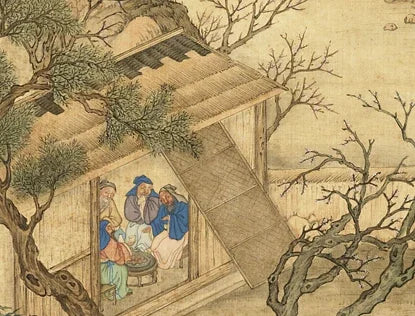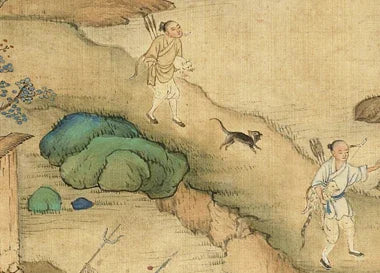SL Book Store
Manual of Twelve Months from the Yin Feng Collection, Thirty-Six Leaves (including details). Qing Dynasty. Inscription by Zhang Shicheng. Silk, colored (36.4x33.3 cm). Collection of the Taipei Palace Museum-PDF
Manual of Twelve Months from the Yin Feng Collection, Thirty-Six Leaves (including details). Qing Dynasty. Inscription by Zhang Shicheng. Silk, colored (36.4x33.3 cm). Collection of the Taipei Palace Museum-PDF
Couldn't load pickup availability
This album "The Twelve Months of Bin Feng" depicts the agricultural labor of the Zhou Dynasty throughout the four seasons of a year as recorded in "The Book of Songs · National Songs" section "Bin Feng · July," including hunting, chiseling ice, repairing agricultural tools, farming, sacrifices, picking mulberry, weaving, harvesting rice, picking jujubes, distributing clothes, repairing houses, building fields and orchards, and collecting grain. The album consists of thirty-six pictures, divided by month, with each picture accompanied by a description by Zhang Shicheng. This album is currently housed in the National Palace Museum in Taipei.
The Song of Bin (bīn) in the Book of Songs is a poem that reflects the labor life of the ancient state of Bin during the early Zhou Dynasty, covering all aspects of clothing, food, and housing, and showcasing the customs of the society at that time.
July's fire flows, September brings clothes. On the first day, the wind stirs; on the second, it is fierce; without clothes, without coarse garments, how to endure the year? On the third day, prepare the plow; on the fourth, lift your feet. Join me, my women and children, to tend the southern fields, the field supervisor is overjoyed.
The fire of July, the clothing of September. In spring, the sun shines, and there is a sound of the oriole. The girls carry the noble basket, follow the narrow path, seeking the tender mulberry. The spring days are long, gathering the fragrant herbs. The girls' hearts are sad: Will they return with the prince?
July's fire flows, August's reeds sway. In the silkworm month, prune the mulberry trees, take your axe and hatchet, to fell the distant poplar, oh those female mulberry trees. In July, the oriole sings, in August, the warp is full, woven in black and yellow, my crimson is bright, to make the prince's robe.
In April, the herb is in bloom, in May, the cicadas sing. In August, the harvest is gathered, in October, the leaves fall. On the first day, hunt the fox and the marten, for the prince's fur coat. On the second day, they gather, carry the achievements of war, speak of their private pig, offer the boar to the public.
In May, the cricket moves its legs, in June, the grasshopper flutters its wings. In July, they are in the fields, in August, under the eaves, in September, at the door, in October, the cricket enters my bed. Seal the holes and smoke out the rats, seal the north-facing windows and doors. Alas, my women and children, say to change the year, enter this room to live.
In June, eat the jujube and the grape, in July, cook the sesame and the bean, in August, peel the jujube, in October, harvest the rice. Make this spring wine, to wish for longevity. In July, eat melons, in August, break the jar, in September, gather the wild chrysanthemum. Gather the tea and the cypress wood, feed my farmers.
In September, we build the threshing ground, in October, we gather the crops. Barley and millet, sorghum and hemp, beans and wheat. Alas, my farmers, my crops are all the same, ascending to perform palace labor. By day, you gather the reeds, by night, you search for silk; quickly climb the roof, as the hundred grains are sown.
In the second month, we dig ice, in the third, we store it in the cold shade, in the fourth, we gather early, offering lamb and chive. In September, the frost is solemn, in October, the threshing ground is cleaned. With friend's wine, we feast, saying, "kill the lamb." Climb the public hall, lift the bison cup: "May you live forever."
The painter of this book is unknown, each picture is accompanied by a description written by Zhang Shicheng: The first month, the wind blows; the first month, hunting for foxes; the second month, the cold is fierce; the third month, they are the same; the second month, digging ice; the third month, sowing with the plow; the third month, storing in the cold shade; the fourth month, lifting the feet; the fourth month, offering lamb and chive; the month of silkworms, pruning mulberry; in April, the mulberry blossoms; in May, the cicadas sing; in June, the locusts move their legs; in June, the grasshopper flutters its wings; in June, eating hawthorn and grapes; in July, the fire flows; in July, eating melon; in July, the magpie sings; in July, in the wild; in July, cooking sesame and beans; in August, the reeds and grasses; in August, weaving; in August, harvesting; in August, in the house; in August, peeling dates; in August, breaking jars; in September, giving clothes; in September, at the door; in September, picking mulberry; in September, building the threshing ground; in September, solemn frost; in October, the leaves fall; in October, the cricket enters under my bed; in October, harvesting rice; in October, gathering the crops; in October, cleaning the threshing ground. Zhang Shicheng's annotations, in fact, are explanations of the "July" poem in conjunction with the drawings, involving agricultural labor, calendar, and nomenclature. Zhang Shicheng wrote a long annotation on the back leaf of "The Twelve Months of Bin Wind" painting. In this long annotation, Zhang Shicheng said that in the past, most "Bin Wind" paintings were mere interpretations, without dividing them by month, so he painted the "Twelve Months of Bin Wind" album by month. In the annotation, Zhang Shicheng also discussed the reasons why the rulers of all dynasties have valued the "July" poem and made paintings for it, that is, to know the difficulty of the royal business, to understand the hardships of agriculture and silk, and he highly praised the "Poems of Farming and Weaving" in the "Weiyu Bookroom Collection" of Jiaqing Emperor.
Share



